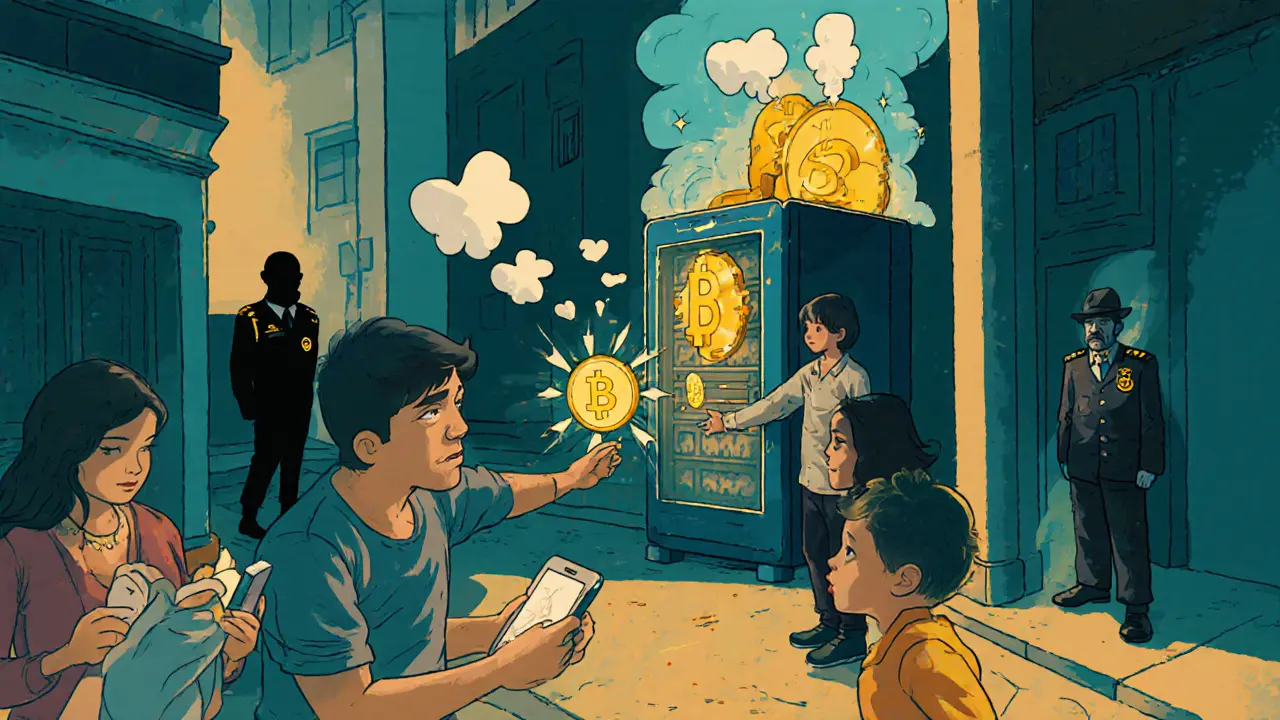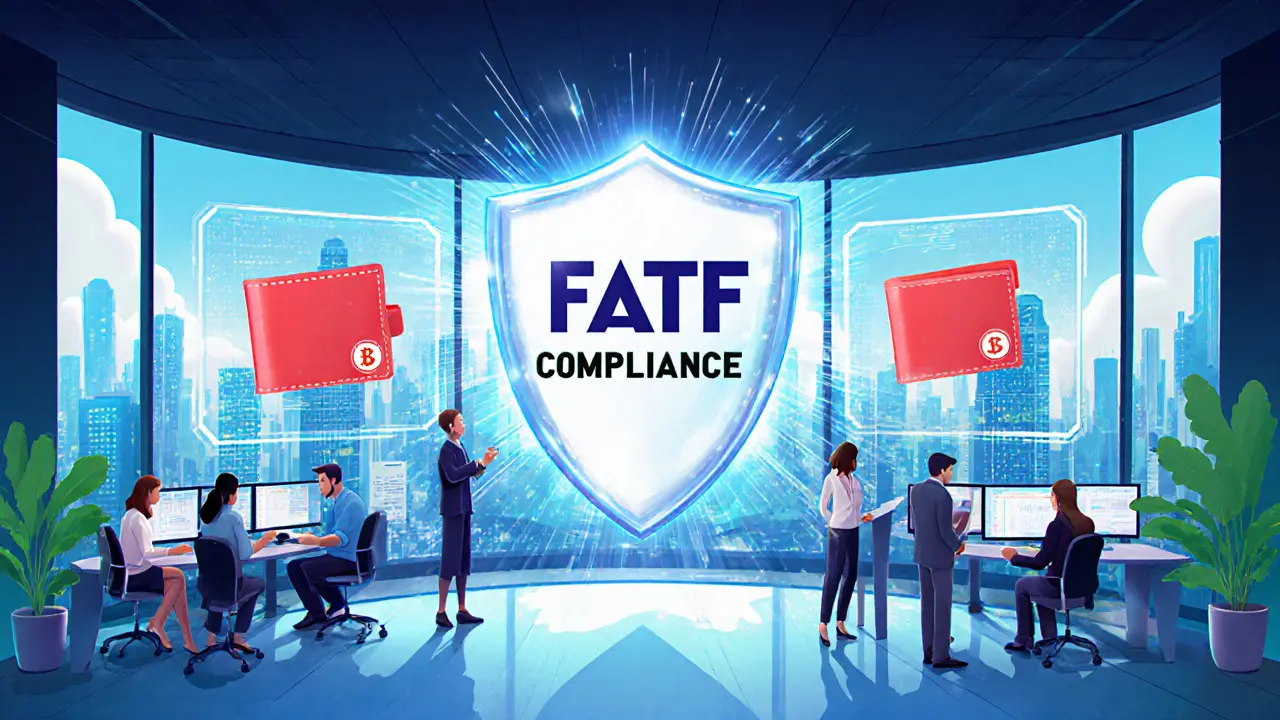FATF Blacklisted Countries: Crypto Risk Explorer
This interactive tool helps you understand the key differences in how FATF treats Iran, North Korea, and Myanmar regarding cryptocurrency-related risks and regulatory responses.
Iran
Primary Risk: Mass Bitcoin outflows, IRGC-linked laundering
FATF Action: Full counter-measures
Regulatory Impact: Asset freezes, transaction bans
North Korea
Primary Risk: State-run hacking, ransomware, exchange thefts
FATF Action: Full counter-measures
Regulatory Impact: Prohibited dealings with VASPs
Myanmar
Primary Risk: Unregulated exchanges, stablecoin remittances
FATF Action: Enhanced due-diligence
Regulatory Impact: Heightened monitoring
Compare Key Factors
| Factor | Iran | North Korea | Myanmar |
|---|---|---|---|
| FATF Status | Full Counter-Measures | Full Counter-Measures | Enhanced Due-Diligence |
| Primary Crypto Threat | Bitcoin outflows, IRGC laundering | Hacking, ransomware, exchange thefts | Unregulated exchanges, remittances |
| Recent Sanction Example | OFAC adds 5 Iranian crypto wallets to SDN list (2024) | ByBit $1.5bn hack attributed to Lazarus Group (2025) | EU sanctions on Myanmar military-linked crypto firms (2023) |
| Regulatory Impact | Asset freezes, transaction bans | Prohibited dealings with VASPs | Heightened monitoring |
User Impact Summary
Transaction Blocking: Exchanges in the US or EU will reject funds linked to sanctioned jurisdictions.
Due-Diligence Fees: VASPs may charge extra for enhanced KYC checks.
Asset Freezing: Assets can be seized if linked to sanctioned activities.
Recommendation: Use reputable exchanges, enable 2FA, and avoid services promising "total anonymity."
When it comes to global finance, FATF blacklist is the list of high‑risk jurisdictions identified by the Financial Action Task Force for serious deficiencies in anti‑money‑laundering and counter‑terrorist‑financing controls. As of June132025 the list still contains three countries - Iran, the Democratic People’s Republic of Korea (North Korea) and Myanmar - and each of them is under intense scrutiny for how they use cryptocurrency to evade sanctions.
Key Takeaways
- Iran, North Korea and Myanmar remain the only three nations on the FATF blacklist in 2025.
- All three exploit crypto’s borderless nature to fund illicit activities and evade sanctions.
- Western regulators (OFAC, FinCEN, etc.) are extending traditional sanctions to digital wallets and exchanges.
- Compliance gaps persist in more than 70% of FATF member states, creating opportunities for crypto‑based money laundering.
- Future FATF updates will likely tighten crypto‑specific requirements, especially for virtual‑asset service providers.
What the FATF Blacklist Means
The Financial Action Task Force ( FATF ) is the global standard‑setter for anti‑money‑laundering (AML) and counter‑financing of terrorism (CFT). Being placed on its blacklist signals two things:
- Serious, unaddressed gaps in a country’s AML/CFT regime.
- A call for member jurisdictions to apply heightened counter‑measures, which can include asset freezes, transaction restrictions, and intensified due‑diligence requirements.
Iran and North Korea face full counter‑measures, while Myanmar is subject to enhanced due‑diligence rules. The distinction matters because full counter‑measures trigger automatic prohibitions on correspondent banking and often extend to crypto‑related services.
Why Cryptocurrency Is Central to the Sanctions Fight
Cryptocurrency offers two features that sanctioned states love:
- Censorship‑resistance - transactions can bypass traditional banking filters.
- Cross‑border speed - value can move instantly to wallets anywhere in the world.
Chainalysis reported that sanctioned jurisdictions moved $15.8billion in crypto in 2024, about 39% of all illicit crypto flows. That share grew to almost 60% of total sanctions‑related activity by the end of the year, underscoring how crypto has become a preferred channel for evading restrictions.
Iran: Crypto as a Lifeline Under Sanctions
Sanctions have forced Iran to look for alternatives to the SWIFT system. The result is a rapid rise in domestic crypto exchanges and a surge in Bitcoin usage among ordinary Iranians. In 2024, Iranian exchanges saw transaction outflows equivalent to roughly $2.3billion, a clear sign of capital flight.
Key drivers include:
- Limited access to foreign currency - people turn to Bitcoin as a store of value.
- State‑run mining farms that generate revenue for the regime.
- Encrypted messaging apps that embed wallet addresses, making peer‑to‑peer transfers easy.
The Iran‑specific risk is amplified by the Islamic Revolutionary Guard Corps (IRGC), which has been flagged by the U.S. Treasury’s Office of Foreign Assets Control (OFAC) for laundering crypto proceeds.

North Korea: The Most Aggressive Crypto Threat
North Korea’s cyber‑army, often called the “Reaper” or “Lazarus Group,” has turned crypto into a war chest. In February 2025 the regime stole $1.5billion from the ByBit exchange - the largest single crypto heist ever recorded. Overall, North Korean actors generated billions in the previous year through ransomware, phishing, and crypto‑exchange hacks.
Why the regime focuses on crypto:
- Hard currency is scarce; digital assets can be converted quickly on secondary markets.
- Crypto wallets are harder to trace than bank accounts when mixers are used.
- International sanctions already block traditional channels, leaving crypto as a viable alternative.
Because of this, the FATF calls for full counter‑measures against North Korea, urging member states to block any virtual‑asset service provider that facilitates transactions linked to the regime.
Myanmar: Crypto Amid Political Turmoil
Following the 2021 military coup, Myanmar’s financial system became fragmented, pushing many businesses and citizens toward crypto for everyday transactions. While the country does not yet face the same level of sanctions as Iran or North Korea, the FATF still subjects it to enhanced due‑diligence because of weak AML controls and the prevalence of unregulated exchange platforms.
Key observations for 2024‑25:
- Local crypto wallets grew by 260% in user count.
- Cross‑border remittances via stablecoins accounted for roughly $350million, often used to bypass capital controls.
- Several exchange operators were shut down by the Myanmar military for alleged “terror financing,” though evidence remains opaque.
The combination of political instability and a nascent crypto ecosystem makes Myanmar a hotspot for illicit fund movements that regulators are only beginning to monitor.
International Regulatory Response
U.S. agencies have taken a front‑row seat in the crypto‑sanctions fight. In 2024, the Office of Foreign Assets Control (OFAC) added 13 cryptocurrency addresses to its Specially Designated Nationals (SDN) list - the second‑highest annual total in the past seven years. Simultaneously, the Financial Crimes Enforcement Network (FinCEN) has proposed new rules to designate entities like the Huione Group as primary money‑laundering concerns.
Key actions include:
- Blocking crypto wallets that show links to Iranian IRGC or North Korean accounts.
- Requiring U.S. financial institutions to perform enhanced due‑diligence on any crypto‑related transaction involving the three blacklisted states.
- Expanding the reach of sanctions to mixers and privacy‑focused coins, which are frequently used to obfuscate the source of stolen funds.
Compliance Challenges for Global Financial Institutions
Even with aggressive enforcement, compliance remains a moving target. As of April2024, about 75% of FATF member countries were either non‑compliant or only partially compliant with the AML/CFT standards for virtual‑asset service providers (VASPs). This creates a patchwork where criminals can route transactions through jurisdictions with lax oversight.
Typical pain points for banks and crypto firms include:
- Identifying the true beneficiary of a wallet that uses a mixing service.
- Keeping up with rapidly changing sanction lists and ensuring real‑time screening.
- Balancing customer privacy expectations with mandatory reporting obligations.
Training programs like the Counter Illicit Finance Teams (CIFT) initiative, run jointly by FinCEN and the State Department, aim to close these gaps by sharing best practices with partner nations.

Practical Implications for Crypto Users
If you’re a trader, investor, or everyday user, the blacklist affects you in three concrete ways:
- Transaction blocking - Exchanges that operate in the U.S. or EU will automatically reject deposits or withdrawals linked to wallets flagged under OFAC or FATF sanctions.
- Higher due‑diligence fees - VASPs may charge extra for enhanced KYC checks if your IP address or wallet activity suggests a connection to Iran, North Korea, or Myanmar.
- Risk of frozen assets - If a regulator determines that your wallet holds proceeds from a sanctioned jurisdiction, the assets can be seized without prior notice.
Staying compliant is simple: use reputable exchanges, enable two‑factor authentication, and avoid services that promise “total anonymity.”
Looking Ahead: FATF’s Evolving Crypto Strategy
The FATF continues to refine its approach. In June2025 it added the British Virgin Islands and Bolivia to the “Jurisdictions Under Increased Monitoring” list while removing Croatia, Mali, and Tanzania. However, Iran, North Korea, and Myanmar remain on the high‑risk blacklist, indicating that the current enforcement model has yet to achieve full compliance.
Future trends likely include:
- More granular guidance on how VASPs should screen for sanctioned wallet addresses.
- Potential extension of counter‑measures to cover stablecoins and tokenized assets that move on public blockchains.
- Increased international cooperation between FIUs (Financial Intelligence Units) to share real‑time data on illicit crypto flows.
For the crypto industry, the message is clear: adapt quickly, invest in robust AML tools, and monitor sanction updates daily.
Comparison of the Three Blacklisted Countries
| Country | FATF Action | Primary Crypto Threat | Recent Sanctions Example |
|---|---|---|---|
| Iran | Full counter‑measures (asset freezes, transaction bans) | Mass Bitcoin outflows, IRGC‑linked laundering | OFAC adds 5 Iranian crypto wallets to SDN list (2024) |
| North Korea | Full counter‑measures (prohibited dealings) | State‑run hacking, ransomware, exchange thefts | ByBit $1.5bn hack attributed to Lazarus Group (2025) |
| Myanmar | Enhanced due‑diligence (heightened monitoring) | Unregulated exchanges, stablecoin remittances | EU sanctions on Myanmar military‑linked crypto firms (2023) |
Next Steps for Crypto Businesses
Whether you run an exchange, a wallet provider, or a compliance consultancy, consider these three actions:
- Implement real‑time sanction screening - integrate APIs that pull the latest OFAC and FATF lists, including wallet addresses.
- Upgrade transaction monitoring - use blockchain analytics to flag mixing service usage, rapid token swaps, and cross‑chain bridges linked to the three blacklisted states.
- Train staff on geopolitical risk - run quarterly briefings on how sanctions evolve, especially after FATF updates.
Doing so not only reduces legal exposure but also builds trust with regulators and customers.
Frequently Asked Questions
What does it mean when a country is on the FATF blacklist?
Being on the blacklist signals that the country fails to meet international AML/CFT standards. Member states must apply extra counter‑measures, such as freezing assets, blocking transactions, and requiring enhanced due‑diligence on any business linked to that jurisdiction.
How are cryptocurrency sanctions enforced?
Sanctions agencies publish lists of prohibited wallet addresses, exchanges, and service providers. Crypto platforms must screen transactions against these lists and report or block any matches. Failure to comply can result in hefty fines and loss of banking relationships.
Can I still use Bitcoin if I live in a sanctioned country?
Technically you can, but most reputable exchanges will refuse to onboard you, and any on‑ramp or off‑ramp service may freeze your funds if they detect a link to a sanctioned jurisdiction. Using peer‑to‑peer methods carries legal risk if authorities trace the activity.
Why does the FATF treat Myanmar differently from Iran and North Korea?
Myanmar is subject to enhanced due‑diligence rather than full counter‑measures because its AML framework, while weak, is not as entrenched in state‑controlled illicit finance as Iran’s IRGC or North Korea’s cyber‑army. The FATF therefore requires extra scrutiny but does not automatically block all financial ties.
What should crypto businesses do to stay compliant with FATF expectations?
Adopt robust AML/KYC programs, integrate real‑time sanction screening (including wallet addresses), monitor for mixing services, and keep staff updated on FATF and OFAC announcements. Documentation and audit trails are essential for regulators.


Kate O'Brien
The FATF blacklist is really just a tool for the big powers to keep control.
They pretend it is about money laundering but they really want to scare anyone who uses crypto.
Iran, North Korea and Myanmar are singled out because they don't follow the western agenda.
The list lets banks block any wallet that looks even a little bit suspicious.
That means everyday people can have their funds frozen without a chance to fight it.
The crypto world is already hard enough without a secret police watching every trade.
The article shows how OFAC adds wallets, but it doesn't tell you who decides those wallets.
Many think the sanctions are about stopping crime, but they also raise huge profit for compliance firms.
Those firms get paid to scan every transaction, turning privacy into a paid service.
Meanwhile the governments claim they are protecting us, yet they get to decide what is illegal.
If a user in Australia wants to send Bitcoin to a friend in Iran, the bank will just say no.
The ordinary trader is left wondering if the rules are fair or just another power play.
I keep hearing that the FATF will add more countries soon, which feels like a growing net.
Every new addition makes the crypto space tighter and the control stronger.
In the end we all lose freedom, and the only ones who win are the ones who already control the money.
Ricky Xibey
Wow, this is intense, but the crypto world keeps moving.
Sal Sam
The FATF's full counter‑measures impose AML/KYC obligations on VASPs, requiring real‑time wallet address screening against OFAC SDN lists. This escalates compliance costs, as firms must integrate blockchain analytics APIs capable of detecting mixing services, chain hopping, and rapid token swaps. Moreover, the jurisdiction‑specific risk matrices for Iran, North Korea, and Myanmar necessitate differentiated monitoring rules: high‑risk transaction velocity thresholds for Iran, AI‑driven pattern recognition for North Korean ransomware flows, and enhanced due‑diligence triggers for Myanmar’s stablecoin remittances. Failure to flag these activities can result in punitive fines exceeding 2% of annual revenue under the EU’s AML Directive. Consequently, operational resilience hinges on modular AML frameworks that can be swiftly re‑configured as FATF guidance evolves.
Moses Yeo
One might argue, perhaps, that the very act of labeling nations as "high‑risk" is an exercise in geopolitical narrative construction; yet, the data, while undeniably compelling, also invites a more critical contemplation of intent-are we safeguarding the financial system, or merely extending a shadow of influence across borders?; The juxtaposition of Iran's sanctioned crypto outflows with North Korea's ransomware campaigns illustrates a spectrum of threat vectors, each demanding a tailored regulatory response; Meanwhile, Myanmar's enhanced due‑diligence stance seems, on the surface, a compromise, but it could also be perceived as a strategic foothold for future escalation.
Lara Decker
The figures in the article line up with what we've been seeing in compliance circles: Iran's wallets are being frozen en masse, North Korea's hacks are prompting outright bans, and Myanmar's situation remains a gray area that forces extra checks. It's a clear signal that regulators are tightening the net, and VASPs need to adjust their risk models accordingly.
Anna Engel
Oh sure, because letting three rogue states dictate global crypto policy is exactly the kind of brilliance we need-nothing says "fairness" like a one‑size‑fits‑all blacklist that conveniently lines up with the interests of the biggest banks.
manika nathaemploy
i totally get how scary this can feel, especially when you just want to send some btc to family. hope everyone stays safe and finds good platforms.
Mark Bosky
For organizations seeking compliance, I recommend the following steps: 1) Integrate a real‑time sanction screening API covering OFAC, EU, and FATF lists, including wallet addresses. 2) Deploy blockchain analytics to monitor for mixers and rapid token conversion patterns. 3) Conduct quarterly training sessions on the evolving FATF counter‑measure guidelines, emphasizing the distinctions between full counter‑measures and enhanced due‑diligence. 4) Document all investigations and maintain audit trails to demonstrate due diligence in the event of regulator inquiries.
Debra Sears
Your structured approach provides a clear roadmap for compliance teams; the emphasis on real‑time screening and staff training is especially valuable given how quickly sanction lists can change.
Jasmine Kate
Reading this feels like watching a crypto apocalypse unfold-once the big players clamp down, the rest of us are left scrambling for safe harbors, and the drama only gets louder.
EDWARD SAKTI PUTRA
The situation is certainly serious, yet it's important to remember that many compliant services still operate safely by following the guidelines and staying informed.
Jack Stiles
yeah, it's a lot to take in, but staying chill and using reputable exchanges can keep things smooth.
Ritu Srivastava
It is utterly unacceptable that ordinary users are forced to shoulder the burden of these geopolitical games; we must demand ethical standards that protect individuals from being collateral damage.
Liam Wells
While the article presents a seemingly exhaustive overview, one must critically assess whether the FATF's methodology genuinely mitigates illicit activity or merely serves as a veneer for broader financial domination; the selective application of full counter‑measures suggests a strategic bias that warrants further scrutiny.